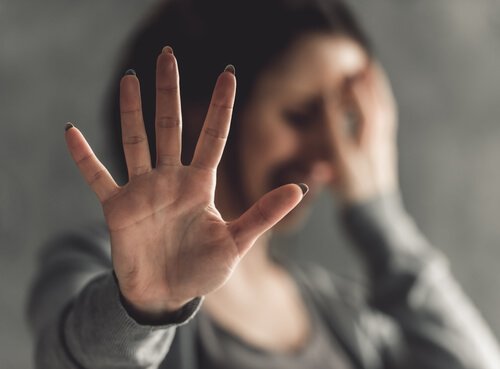The Consequences of Sexual Violence

When people hear the term “sexual violence,” they immediately think of child abuse or forced crimes committed by strangers. Although these are extreme examples of this phenomenon, they’re not the only ones. Sexual violence manifests in many ways. In fact, it often occurs within the context of stable couples who otherwise appear to be “normal”.
Sexual violence is always deplorable, no matter how it manifests. Although most people believe only males commit it, many women are aggressors. This type of violence can take the form of anything from verbal abuse to direct physical attacks.
“Violence is the last refuge of the incompetent.”
-Isaac Asimov-
Sexual violence has many consequences, such as feelings of shame and frustration. In more severe cases, they can take the form of depression or even suicide.
Conceptualization of the Problem
The World Health Organization (WHO) defines sexual violence as an “any sexual act, attempt to obtain a sexual act, unwanted sexual comments or advances, or acts to traffic, or otherwise directed, against a person’s sexuality using coercion, by any person regardless
of their relationship to the victim, in any setting, including but not limited to home and work”.
Additionally, experts consider that it encompasses situations where the victim is unable to give consent. For example, people who’re drunk, under the effects of drugs, asleep, or mentally incapacitated are unable to give consent.

No specific standards define what’s “normal” or “abnormal” when it comes to sexuality. Some couples enjoy inflicting physical pain on each other. The key words here are “each other”. It happens between adults, there’s an agreement between them, and it doesn’t lead to greater negative consequences.
Sexual violence, then, isn’t only related to aggressive shows of sexuality. What differentiates it from that is that one of the people involved endures physical or emotional suffering they don’t want to feel. Added to this, the aggressor ignores the victim’s desire to avoid these types of experiences. That is to say, one person forces themselves onto another.
Types of Sexual Violence
Sexual violence manifests in different ways. Sometimes it manifests in the street and the aggressors are strangers. Other times, it manifests in families or couples.

The main types of sexual violence are:
- Sexual harassment. A type of psychological violence in which one person pressures, coerces, intimidates, or blackmails the other. Their objective is to force them to have sexual relations with them.
- Sexual abuse. Any situation in which one person is forced to do sexual acts against their will. It may be the most harmful type of sexual violence.
- Sexual assault. It includes any form of non-consensual contact with another person’s body with sexual aims. This includes groping.
Verbal sexual attacks are also part of the sexual violence continuum. These include abusive attacks aimed at a person’s body or expressions that symbolically infringe on their sexuality.
The Consequences of Sexual Violence
The consequences of sexual violence depend on the severity of the acts, the characteristics of the victim, and the context in which it occurs. Independent of all of this, though, it’s always a serious situation. You shouldn’t hesitate to take legal, medical, and psychological actions to amend it.

The most common consequences of these types of acts are:
- Post-traumatic stress disorder. This is a disorder characterized by anxiety and recurring memories about what happened. People with this condition may also feel depressed or angry.
- Strong feelings of shame and guilt. Victims of this phenomenon tend to feel personally responsible for what’s happening to them. They attack themselves with baseless reproaches.
- Depression. Depression is a common consequence of this type of violence. In the most severe cases, it can lead to progressive isolation. It can also end up causing extremely severe symptoms resulting in self-harm or even suicide.
- Substance abuse. Many people choose to start using psychoactive drugs in order to try and lessen or manage the feelings of guilt, anxiety, anger, or depression that come over them after they’re sexually abused.
Those who are victims of sexual violence are often unable to defend themselves because the adrenaline release may be so intense that it neutralizes the areas of the brain responsible for reasoning and decision-making. Thus, victims of sexual violence need professional psychological support.
When people hear the term “sexual violence,” they immediately think of child abuse or forced crimes committed by strangers. Although these are extreme examples of this phenomenon, they’re not the only ones. Sexual violence manifests in many ways. In fact, it often occurs within the context of stable couples who otherwise appear to be “normal”.
Sexual violence is always deplorable, no matter how it manifests. Although most people believe only males commit it, many women are aggressors. This type of violence can take the form of anything from verbal abuse to direct physical attacks.
“Violence is the last refuge of the incompetent.”
-Isaac Asimov-
Sexual violence has many consequences, such as feelings of shame and frustration. In more severe cases, they can take the form of depression or even suicide.
Conceptualization of the Problem
The World Health Organization (WHO) defines sexual violence as an “any sexual act, attempt to obtain a sexual act, unwanted sexual comments or advances, or acts to traffic, or otherwise directed, against a person’s sexuality using coercion, by any person regardless
of their relationship to the victim, in any setting, including but not limited to home and work”.
Additionally, experts consider that it encompasses situations where the victim is unable to give consent. For example, people who’re drunk, under the effects of drugs, asleep, or mentally incapacitated are unable to give consent.

No specific standards define what’s “normal” or “abnormal” when it comes to sexuality. Some couples enjoy inflicting physical pain on each other. The key words here are “each other”. It happens between adults, there’s an agreement between them, and it doesn’t lead to greater negative consequences.
Sexual violence, then, isn’t only related to aggressive shows of sexuality. What differentiates it from that is that one of the people involved endures physical or emotional suffering they don’t want to feel. Added to this, the aggressor ignores the victim’s desire to avoid these types of experiences. That is to say, one person forces themselves onto another.
Types of Sexual Violence
Sexual violence manifests in different ways. Sometimes it manifests in the street and the aggressors are strangers. Other times, it manifests in families or couples.

The main types of sexual violence are:
- Sexual harassment. A type of psychological violence in which one person pressures, coerces, intimidates, or blackmails the other. Their objective is to force them to have sexual relations with them.
- Sexual abuse. Any situation in which one person is forced to do sexual acts against their will. It may be the most harmful type of sexual violence.
- Sexual assault. It includes any form of non-consensual contact with another person’s body with sexual aims. This includes groping.
Verbal sexual attacks are also part of the sexual violence continuum. These include abusive attacks aimed at a person’s body or expressions that symbolically infringe on their sexuality.
The Consequences of Sexual Violence
The consequences of sexual violence depend on the severity of the acts, the characteristics of the victim, and the context in which it occurs. Independent of all of this, though, it’s always a serious situation. You shouldn’t hesitate to take legal, medical, and psychological actions to amend it.

The most common consequences of these types of acts are:
- Post-traumatic stress disorder. This is a disorder characterized by anxiety and recurring memories about what happened. People with this condition may also feel depressed or angry.
- Strong feelings of shame and guilt. Victims of this phenomenon tend to feel personally responsible for what’s happening to them. They attack themselves with baseless reproaches.
- Depression. Depression is a common consequence of this type of violence. In the most severe cases, it can lead to progressive isolation. It can also end up causing extremely severe symptoms resulting in self-harm or even suicide.
- Substance abuse. Many people choose to start using psychoactive drugs in order to try and lessen or manage the feelings of guilt, anxiety, anger, or depression that come over them after they’re sexually abused.
Those who are victims of sexual violence are often unable to defend themselves because the adrenaline release may be so intense that it neutralizes the areas of the brain responsible for reasoning and decision-making. Thus, victims of sexual violence need professional psychological support.
This text is provided for informational purposes only and does not replace consultation with a professional. If in doubt, consult your specialist.







